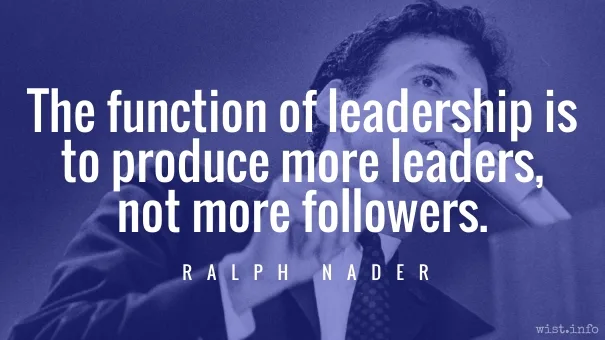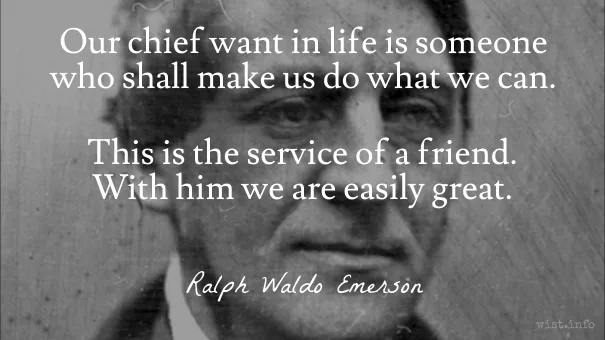Liberty trains for liberty. Responsibility is the first step in responsibility.
W. E. B. Du Bois (1868-1963) American writer, historian, social reformer [William Edward Burghardt Du Bois]
John Brown, ch. 13 “The Legacy of John Brown” (1909)
(Source)
On the policy among white colonial powers that non-whites "ought to be under the restraint and benevolent tutelage of stronger and wiser nations for their own benefit," until they are "capable" of being free.
Quotations about:
mentor
Note not all quotations have been tagged, so Search may find additional quotes on this topic.
A professor can never better distinguish himself in his work than by encouraging a clever pupil, for the true discoverers are among them, as comets amongst the stars.
Carl Linnaeus (1707-1778) Swedish botanist, zoologist, taxonomist, physician [Carl von Linné, Carolus Linnæus]
Quoted in Theodor Magnus Fries, Linnaeus, ch. 10 “Pupils” (1903) [ed./tr. B. J. Jackson (1923)]
(Source)
She became for me an island of light, fun, wisdom where I could run with my discoveries and torments and hopes at any time of day and find welcome.
May Sarton (1912-1995) Belgian-American poet, novelist, memoirist [pen name of Eleanore Marie Sarton]
A World of Light, ch. 4 (1976)
(Source)
Referring to Edith Forbes Kennedy (1890-1942), a long-time mentor and "muse."
Keep away from people who try to belittle your ambitions. Small people always do that, but the really great make you feel that you, too, can become great.
The function of leadership is to produce more leaders, not more followers.
Ralph Nader (b. 1934) American attorney, author, lecturer, political activist
Time Leadership Conference, Washington, DC (Sep 1976)
(Source)
In "Leadership: The Biggest Issue," Time (8 Nov 1976).
Be noble! And the nobleness that lies
In other men, sleeping, but never dead,
Will rise in majesty to meet thine own.James Russell Lowell (1819-1891) American diplomat, essayist, poet
“Sonnet 4” (1840)
(Source)
Often presented as a simple sentence, rather than lines within a larger poem.
Of the best rulers
The people (only) know that they exist;
The next best they love and praise;
The next they fear;
And the next they revile.
When they do not command the people’s faith,
Some will lose faith in them,
And then they resort to oaths!
But (of the best) when their task is accomplished, their work done,
The people all remark, “We have done it ourselves.”Lao-tzu (604?-531? BC) Chinese philosopher, poet [also Lao-tse, Laozi]
The Wisdom of Laotse, ch 17 (1948) [tr. Lin Yutang]
Alt. trans. [Tao-te Ching tr. Wing-Tsit Chan]:
"The best are those whose existence is merely known by the people.
The next best are those who are loved and praised.
The next are those who are feared.And the next are those who are reviled.
The great rulers accomplish their task; they complete their work.
Nevertheless their people say that they simply follow Nature."
When Tzŭ Kung asked about the practice of virtue the Master replied: “A workman who wants to do his work well must first sharpen his tools. In whatever State you dwell, take service with the worthiest of its ministers, and make friends of the most Virtuous of its scholars.”
[子貢問爲仁。子曰、工欲善其事、必先利其器、居是邦也、事其大夫之賢者、友其士之仁者。]
Confucius (c. 551- c. 479 BC) Chinese philosopher, sage, politician [孔夫子 (Kǒng Fūzǐ, K'ung Fu-tzu, K'ung Fu Tse), 孔子 (Kǒngzǐ, Chungni), 孔丘 (Kǒng Qiū, K'ung Ch'iu)]
The Analects [論語, 论语, Lúnyǔ], Book 15, verse 10 (15.10) (6th C. BC – AD 3rd C.) [tr. Soothill (1910), 15.9]
(Source)
Originally numbered 15.9 by Legge, current translations identify it as 15.10. (Source (Chinese)). Alternate translations:Tsze-kung asked about the practice of virtue. The Master said, "The mechanic, who wishes to do his work well, must first sharpen his tools. When you are living in any state, take service with the most worthy among its great officers, and make friends of the most virtuous among its scholars."
[tr. Legge (1861), 15.9]T'sz-kung asked how to become philanthropic. The Master answered him thus: "A workman who wants to do his work well must first sharpen his tools. In whatever land you live, serve under some wise and good man among those in high office, and make friends with the more humane of its men of education."
[tr. Jennings (1895), 15.9]A disciple of Confucius enquired how to live a moral life. Confucius answered, "A workman who wants to perfect his work first sharpens his tools. When you are living in a country, you should serve those nobles and ministers in that country who are men of moral worth, and you should cultivate the friendship of the gentlemen of that country who are men of moral worth."
[tr. Ku Hung-Ming (1898), 15.9]Tze-kung asked about this business of manhood. He said: The craftsman wanting to perfect his craft must first put an edge on his tools (take advantage of implements already there, the containers). Living in a country, take service with the big men who have solid merit, make friends with the humane scholar-officers.
[tr. Pound (1933), 15.9]Tzu-kung asked how to become Good. The Master said, A craftsman, if he means to do good work, must first sharpen his tools. In whatever state you dwell:
Take service with such of its officers as are worthy,
Make friends with such of its knights as are Good.
[tr. Waley (1938), 15.9]When the workman wishes to do a better job, he must first sharpen his tools. So, in your case, no matter what state you inhabit, serve only the grand gentlemen of highest caliber, make friends only with those gentlemen who are manhood at its best.
[tr. Ware (1950)]Tzu-kung asked about the practice of benevolence. The Master said, "A craftsman who wishes to practice his craft well must first sharpen his tools. You should, therefore, seek the patronage of the most distinguished Counsellors and make friend with the most benevolent Gentlemen in the state where you happen to be staying."
[tr. Lau (1979)]Zigong asked about practising humaneness. The Master said: "If he wishes to make his work good, the craftsman must first sharpen his tools. If one is staying in a particular state, one serves the people of highest quality among its grandees and makes friends with the most humane among its public servants."
[tr. Dawson (1993)]Zigong asked how to practice humanity. The Master said: "A craftsman who wishes to do good work must first sharpen his tools. In whatever country you settle, offer your services to the most virtuous ministers, and befriend those gentlemen who cultivate humanity."
[tr. Leys (1997)]When Zi-gong asked how to cultivate humanity, the Master said: "If an artisan wishes to perfect his craft, he must first sharpen his tools. Living in this state, serve the worthy of its ministers and befriend the humane of its shi."
[tr. Huang (1997)]Zigong asked how to practice the benevolence, Confucius said: "A worker wants to finish his job perfectly, must sharpen his tool first. One lives in this state, should service the sagacious persons in the senior officials, should make friends with the benevolent persons in the intellectuals.
[tr. Cai/Yu (1998)]Zigong inquired about authoritative conduct (ren). The Master replied, "Tradesmen wanting to be good at (shan) their trade must first sharpen their tools. While dwelling in this state, then, we should serve those ministers who are of the highest character (xian), and befriend those scholar-apprentices (shi) who are most authoritative in their conduct.
[tr. Ames/Rosemont (1998)]Dž-gùng asked about being ren. The Master said, If an artisan wants to do his job well, he must first sharpen his tools. When dwelling in some country, serve the worthy among its dignitaries; befriend the ren among its officers.
[tr. Brooks/Brooks (1998)]Adept Kung asked about the practice of Humanity, and the Master said: “If a craftsman wants to do good work, he must first sharpen his tools. If you want to settle in a country, you must cultivate its wise ministers and befriend its Humane officials.”
[tr. Hinton (1998)]Zigong asked about becoming Good. The Master said, “Any craftsman who wishes to do his job well must first sharpen his tools. In the same way, when living in a given state, one must serve those ministers who are worthy and befriend those scholar-officials who are Good.”
[tr. Slingerland (2003)]Zigong asked how to practice humaneness. The Master said, A craftsman who wants to do his job well must first sharpen his tools. Whatever country you are in, be of service to the high officials who are worthy and become friends with the men of station who are humane.
[tr. Watson (2007)]Zigong asked about the practice of humaneness. The Master said, "Artisans who wish to excel at their craft must sharpen their tools. When you live in any given state, you should serve the worthiest among the counselors and befriend the most human among the educated professionals."
[tr. Chin (2014)]Zi Gong asked about Ren virtue. Confucius said, "When a craftsman [technician] wants to do a good job, he must sharpen his tools beforehand. After you have arrived in that country, serve and align yourself with competent and virtuous officials working for the prime minister and befriend colleagues hwo have the Ren virtue.
[tr. Li (2020)]
A frequent English paraphrase, attributed to Confucius but without citation to a particular analect, can be found as early as 1831:The expectations of life depend upon diligence; the mechanic that would perfect his work must first sharpen his tools.
Our chief want in life is someone who shall make us do what we can. This is the service of a friend. With him we are easily great.
Ralph Waldo Emerson (1803-1882) American essayist, lecturer, poet
Essay (1860), “Considerations by the Way,” The Conduct of Life, ch. 7
(Source)
Based on a course of lectures by that name first delivered in Pittsburg, 1851-03.













